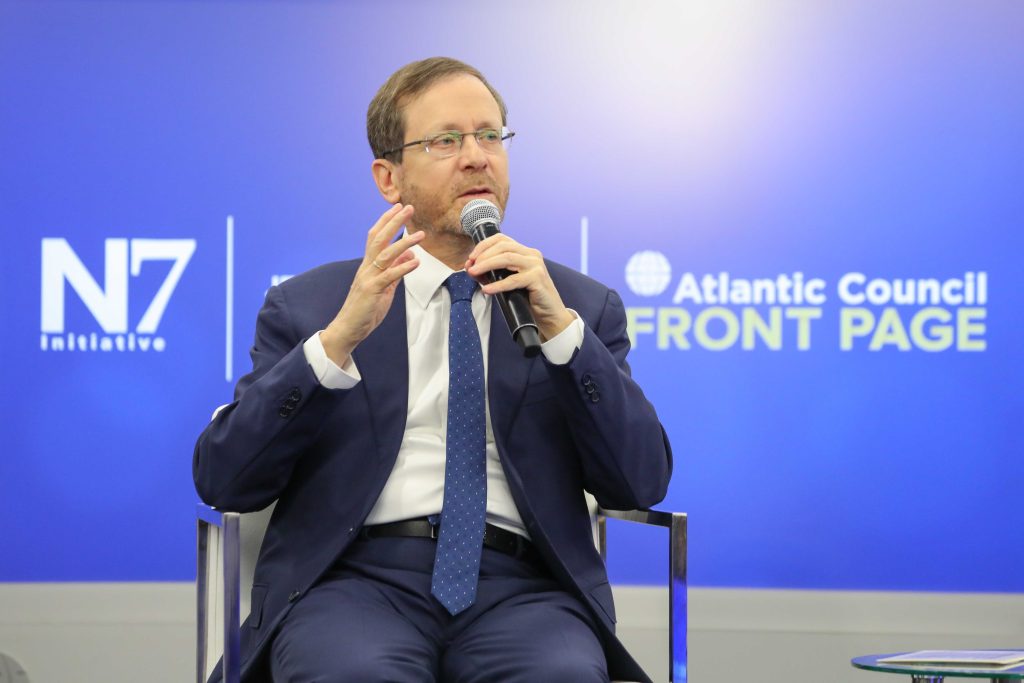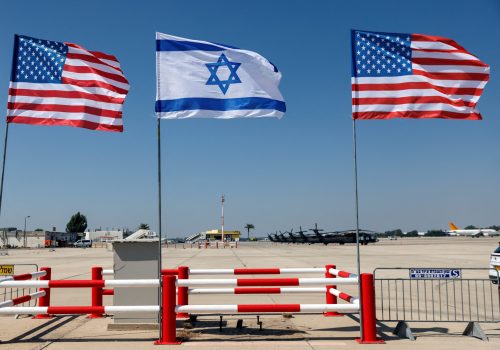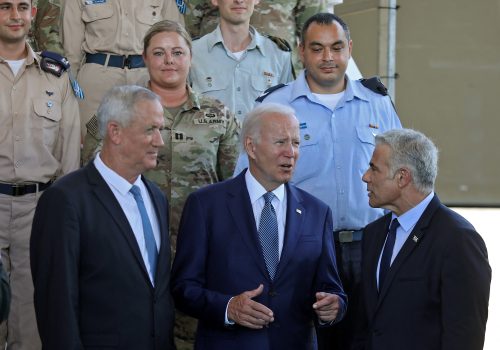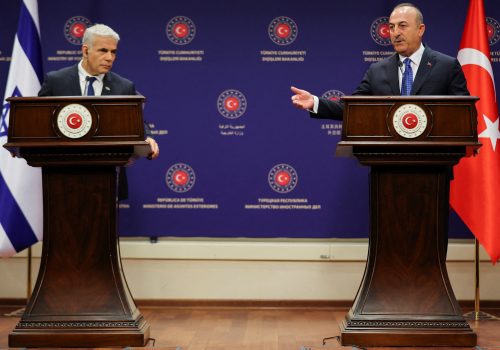Following a series of Russian attacks on Ukraine using kamikaze drones in recent weeks, the international community quickly pointed the finger at Iran for supplying the technology. Iran has repeatedly denied arming Russia, with Iranian Foreign Minister Hossein Amir-Abdollahian saying on Monday that should evidence emerge that Russia is using Iran-made drones, Tehran “will not remain indifferent.”
At the Atlantic Council on Tuesday, Israeli President Isaac Herzog brought the evidence—multiple photographs of drones in Ukraine that matched Iranian models.
“This is only the tip of the iceberg of a lot of intelligence information,” Herzog said of the evidence, which he also planned to present to US officials in Washington this week. “One has to assume Iran is participating in the war in Ukraine, taking action against the people of Ukraine, and creating enormous suffering and pain.”
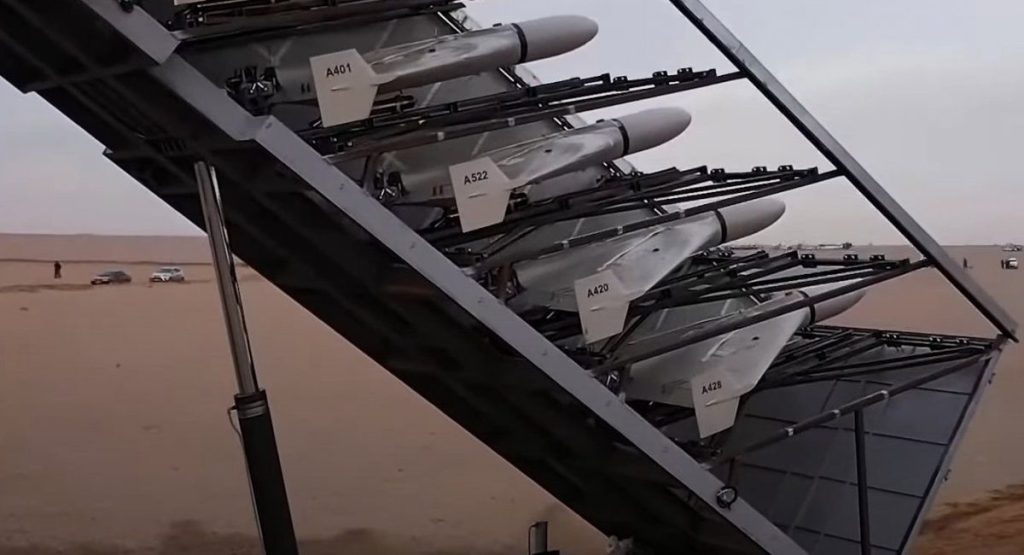
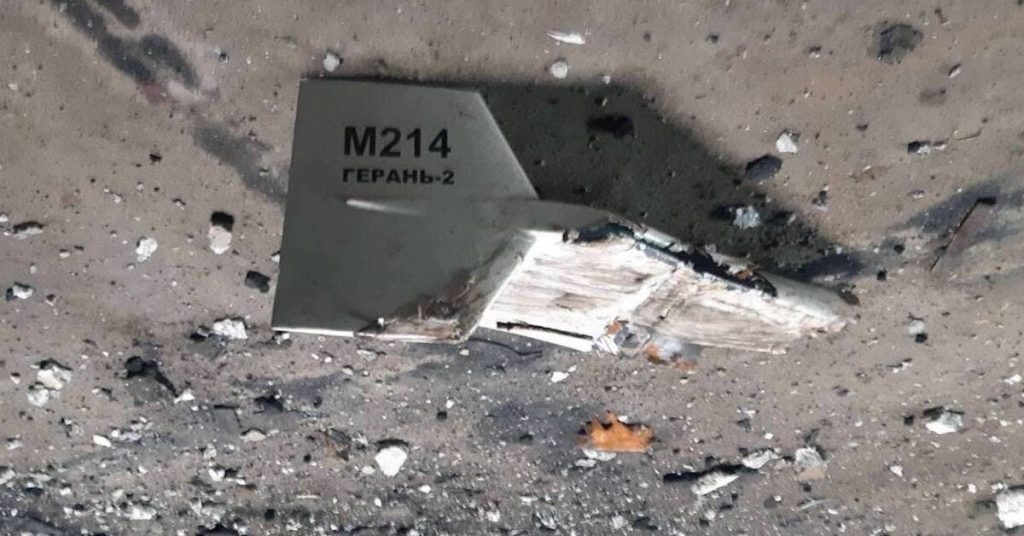
Ahead of his visit with US President Joe Biden, Herzog spoke at an Atlantic Council Front Page event hosted by the N7 Initiative, a partnership between the Council and the Jeffrey M. Talpins Foundation dedicated to advancing normalization, peace, and stability in the wake of the Abraham Accords normalizations between Israel and Arab states. Former US Rep. Nita Lowey, who introduced Herzog, noted that the initiative will include a series of multilateral conferences in the coming months on agriculture, trade, and education “to foster sustainable ties between Israel and its neighbors.”
Herzog’s visit to Washington also was scheduled to include a Wednesday meeting with Biden, and the Israeli president signaled that the next steps against Iran will be a key part of his discussion—as Biden is resisting an all-out pressure campaign against Tehran that could threaten nuclear talks with the regime. “The world must expose this truth and confront Iran and ask it simple questions.” Herzog said. “Can the international community negotiate with Iran… when we know that they are both rushing to a nuclear bomb as well as doing the other terrible things?”
Herzog discussed a wide range of issues facing Israel and the Middle East with Atlantic Council distinguished fellow Daniel B. Shapiro, who served as US ambassador to Israel from 2011 to 2017. Here are more of the key takeaways.
Israel’s involvement in Ukraine
- Herzog said Israel has helped Ukraine with the early detection of missile attacks, but defended his nation’s decision not to provide military aid. “There are things we cannot supply due to national security interests of utmost importance, and that is, by the way, the rule in many other countries,” Herzog said. “I think the compass that judges us at times is distorted.”
- However, Israel has remained active in providing humanitarian help, Herzog said, both setting up medical centers in Ukraine and treating wounded Ukranians in Israeli hospitals. “If you walk around the various volunteering organizations and NGOs in Ukraine, Hebrew is the predominant language,” he said.
- Herzog added that Israel is providing post-trauma treatment, particularly by sending experts trained to help provide mental health services for women and children, as part of a joint initiative between his wife, First Lady Michal Herzog, and her Ukrainian counterpart, Olena Zelenska.
N7 and beyond
- Two years in, the Abraham Accords have created “a strategic paradigm shift, something we have dreamt of for ages,” Herzog said. Israel’s integration and diplomatic relations in the region would have been “unimaginable” even a decade ago, he added.
- The treaties also brought “a psychological paradigm shift,” Herzog said, creating new energy around critical issues such as climate change. Israel already signed an agreement to provide energy connectors to Greece, which Herzog sees as a step toward supplying solar energy more broadly. “In my mind, if you look down the road, the region will supply energy one day to Europe, Africa, and Asia: I call it the renewable Middle East.”
- While Saudi Arabia is not part of the Accords, Herzog hinted at thawing relations with his praise of Biden’s recent visit to Riyadh. Added Herzog: “I truly believe that Saudi Arabia is a very important player in the region and also a very central pillar in the Muslim world.”
- Herzog sees more opportunity to expand Israel’s regional partners beyond Morocco, Egypt, Sudan, Jordan, Bahrain, and the United Arab Emirates. “If you take it from North Africa all the way to the Gulf, you have a huge opportunity to move from the N7, to N9, to N12,” Herzog said, calling expansion “in global, regional and, of course, Israeli interest.” He added that think tanks and civil society play a big role here as well as governments. Of the N7, Herzog said “I think it’s a great idea, and I welcome the initiative of the Atlantic Council and the Talpins Foundation.”
- The Israeli president even mentioned the North Atlantic Treaty that created NATO as a possible model for the region. “I believe that there will be a Middle Eastern treaty,” he said. “It may take a generation to get there, but we’re not far away.”
Broader peace and cooperation
- Amid those regional peace talks, Herzog said attempts to renew talks with Palestinian leadership are complicated by current political realities. “It’s important that we have a dialogue,” Herzog said, however he noted that Palestinian leadership is divided, and Israel is still reeling from a “political crisis” after staging five elections in the past three years.
- Herzog remained confident in Israel’s long-running quest to join the United States’ Visa Waiver Program, an issue Biden has made more of a priority since taking office. While Israel still has a number of hurdles to clear, Herzog said a streamlined visa process could fuel significant partnerships down the road. “It will enable so many bright Israelis to travel between the United States and back,” Herzog said, with a particular benefit for the tech sector.
Nick Fouriezos is a writer with more than a decade of journalism experience around the globe.
Further reading
Wed, Oct 12, 2022
Fulfilling the requirements: Israel’s entry into the US Visa Waiver Program
Issue Brief By
A little-discussed, yet far-reaching issue on the US-Israel bilateral agenda is Israel’s long-running quest to join the United States’ Visa Waiver Program (VWP). In his first year and a half in office, US President Joseph R. Biden Jr. has elevated the issue, and efforts to achieve Israel’s entry are gaining momentum after remaining stagnant during the Trump presidency.
Tue, Oct 4, 2022
Iran’s new demands to revive the nuclear deal are a sigh of relief for Israel. Here’s why.
MENASource By
Israel knows very well that Iranian demands are impossible to meet.
Fri, Sep 9, 2022
Iran helped Turkey and Israel mend ties. Here’s how.
MENASource By Ksenia Svetlova
Ankara and Jerusalem will continue to work jointly to prevent terrorist attacks on Israeli citizens in Turkey and explore the possibility of pursuing common goals vis-à-vis the Islamic Republic and its many regional proxies.
